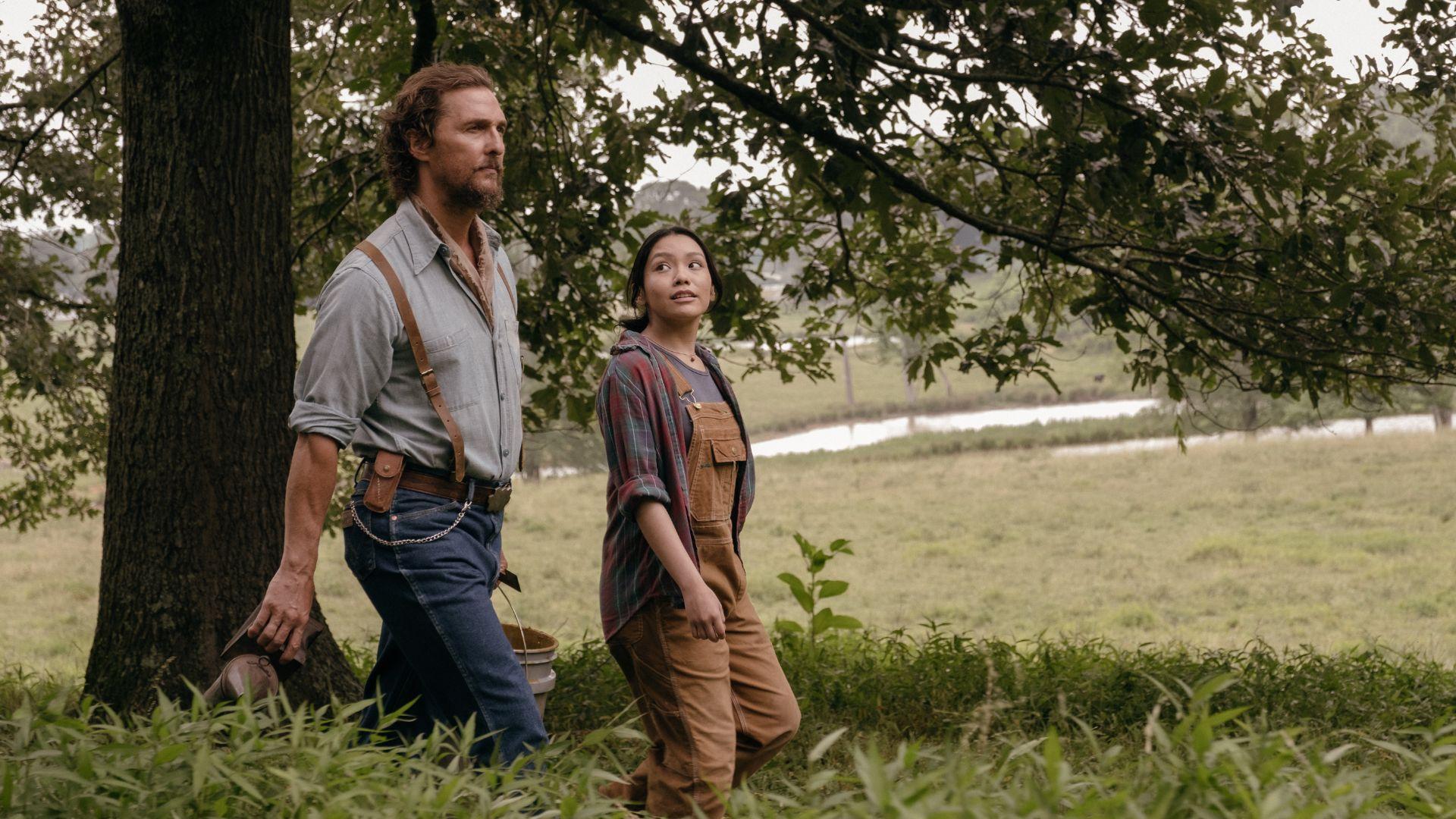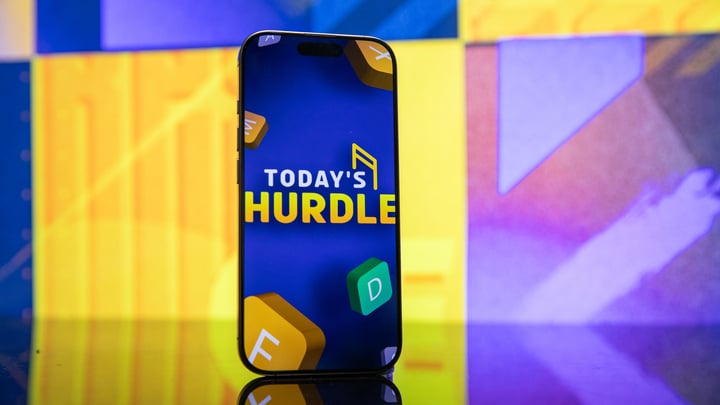Tech
The Rivals of Amziah King review: Matthew McConaughey leads a wildly entertaining musical Western

Andrew Patterson's sophomore feature The Rivals of Amziah King is a comedic modern Western that swerves headfirst into lurid revenge drama — all while featuring soulful musical interludes, centering on a story about stolen bees. It runs the emotional and tonal gamut akin to a South Indian blockbuster, with the requisite stylizations that make it feel enormous in scope. It's country maximalism, with a highly controlled visual approach that feels liberated, to the point of overcoming even the movie's most noticeable flaws.
It starts out incredibly strong, fumbles along the way, but recovers magnificently by throwing off the shackles of expectation (not to mention, of consistent morality). There are times when its tale of a kindly apiarist and mandolin strummer, Amziah King (Matthew McConaughey), verges on outsider art — given its whizbang unfurling and rosy view of disquieting character turns — which only makes it more meaningful when it maintains an unwavering focus on community.
In that vein, the film is equally about Amziah's foster daughter, a young Choctaw girl named Kateri (Angelina LookingGlass), who returns to their rural Oklahoma town after years away, and slowly begins to feel at home. After establishing a wistful, folksy emotional core told with the broadness of soap opera, The Rivals of Amziah King earns the right to fly off the rails, since it also earns its audience's trust enough to know they'll follow.
What is The Rivals of Amziah King about?
It's incredibly appropriate that such delicious junk food cinema opens in the dusty parking lot of a fried steak sandwich shack, where a group of musicians tunes up in preparation for the arrival of their ostensible leader. A cowboy boot hits the ground as the camera tilts up and reveals Amziah — bearded and bandanna'd, much like the film's director — joining his troupe to lead a delightful, impassioned bluegrass number.
The Rivals of Amziah King is as much about its rural setting as it is about its rollicking, Simpsons-esque plot, which builds with detailed absurdity. Soon after the movie's musical intro, Amziah — known to process and harvest honey — is sought out by the local sheriff to consult on the origins of several recovered barrels of the sugary substance.
The movie treats honey, its sale, and its manufacture with the same somberness and gravity as Breaking Bad does crystal meth. This approach becomes even more amusing when Amziah's attempts to discern the barrels' owner — with the help of some blue collar musicians looking for extra cash — results in a gory industrial accident, shot and edited with casual flair. This tips the movie over into a riotous slapstick comedy, whose premise becomes increasingly more difficult to explain to each character Amziah encounters.
As Amziah recovers from the evening's madness in a diner booth at dawn, one of the onlookers he runs into happens to be Kateri, a Native teen who once lived with him when he and his late wife fostered vulnerable youth, now working as a waitress. The realization puts the most loving smiles on both their faces. Much of the movie's first half follows Amziah not only reintroducing Kateri to the community but making her feel a part of it, regaling her with idiosyncratic stories through both speech and song.
The Rivals of Amziah King is a movie about community.
The film's musical numbers are all diegetic, and they all fit within the narrow confines of what Amziah and his band are capable of playing. However, The Rivals of Amziah King has all the energy and heightened reality of a traditional movie musical, whether or not it technically is one. You could make the argument either way, but its songs prove to be a meaningful dramatic venue for how much the reluctant Kateri does or does not feel connected to those around her, as Amziah playfully convinces her to join in the song and dance.
His rustic Southern storytelling borders on folkloric, especially how he ties bees and beekeeping into his nostalgic view of communal bonds. So, it follows that Kateri would find belonging in his employ. During this first hour, the movie's lack of overarching conflict is never a hurdle, given its good-natured allure. However, a sudden turn midway through leads to the disappearance of Amizah's entire bee colony, leaving Kateri as the center of both the narrative and a vigilante investigation into those responsible.
Up to that point, Amziah, and the film at large, have framed the bees not only as a metaphor for their town but an integral part of it as well, by approaching labor as an act of mutual good. Every element of the movie is geared towards ensuring its fabric feels collectivist and communal, even while its colorful individual characters stand out, from Owen Teague's eager fiddler, to Rob Morgan's lawyer-pianist, to Cole Sprouse's fast-food worker and tech sleuth. Perhaps the most lovable among the merry supporting cast is Amziah's buddy and beekeeping handyman played by Scott Shepherd, whose slurred speech is initially impenetrable to outsiders. But as the film goes on, both Kateria and the audience begin to understand him more clearly — as though we'd been welcomed into the community.
The Rivals of Amziah King is filled with the kind of sugary, "aww, shucks" goodness you could see McConaughey using to launch a heartland political career, but at the same time, there's nothing cynical about it. When the film eventually takes its midpoint turn, during which the bees disappear and Amziah is sidelined from the narrative, their absence is palpable. By this point, we understand intuitively how tight-knit the bonds of this small town are, from their potlucks to their gatherings to watch musical performances, and anything that hurts one of them ends up hurting them all.
This detour comes with a few downsides, including a visual language that doesn't immediately match the verve of its first half. However, the impact of those initial scenes continue to ripple and resonate, propelling The Rivals of Amziah King even during its less engaging moments.
The Rivals of Amziah King is an audio-visual treat.
Even when The Rivals of Amziah King shifts into dour territory, forcing Kateri to perform bafflingly malicious actions, the film's communal justifications remain at the back of our minds. This is in part because LookingGlass delivers such a sincere, wide-eyed performance even when turning to ostensible evil — that a turn this ludicrous works is a wonder! — but it's also owed to how unflinchingly the camera captures every physical and ethical dimension.
The film has no qualms about how destructive Kateri becomes during her revenge mission. Her actions aren't violently over the top, but they exist in the shadows and have disturbing ripple effects; at one point, she even considers poisoning a dog to get what she wants. And yet, the camera retains its adoration for her. While this more serious, straightforward second half slows down for a breather, the heroic aesthetic language it uses to capture LookingGlass seldom deviates from how Patterson shoots McConaughey in initial scenes, framing Kateri as a worthy spiritual successor to Amziah.
There's a mythic quality to both lead characters, owed to both subtle push-ins, as well as overt visual swings like speed-ramping and slow-motion during musical scenes, as well as still snapshots during energetic frolic. Each visual detail stands out, from the texture of food to the stomping of boots around the table to create rhythm — even the arhythmic sound Amziah's wedding ring makes when he taps it on the table, drawing attention to a void in his life. The film is in a state of perpetual motion and constant transformation.
Together, all these moments make The Rivals of Amziah King feel like it's floating on air. All the while, it takes you with it, making you feel like you're being lifted out of your seat, thanks to the high of a riotously funny, expertly sappy musical melodrama that borrows from the mythical image-making of traditional Westerns, but creates something wholly new.
The Rivals of Amziah King was reviewed out of its world premiere at 2025 SXSW.
Tech
Hurdle hints and answers for September 25, 2025

If you like playing daily word games like Wordle, then Hurdle is a great game to add to your routine.
There are five rounds to the game. The first round sees you trying to guess the word, with correct, misplaced, and incorrect letters shown in each guess. If you guess the correct answer, it'll take you to the next hurdle, providing the answer to the last hurdle as your first guess. This can give you several clues or none, depending on the words. For the final hurdle, every correct answer from previous hurdles is shown, with correct and misplaced letters clearly shown.
An important note is that the number of times a letter is highlighted from previous guesses does necessarily indicate the number of times that letter appears in the final hurdle.
If you find yourself stuck at any step of today's Hurdle, don't worry! We have you covered.
Hurdle Word 1 hint
We have five of them.
Hurdle Word 1 answer
SENSE
Hurdle Word 2 hint
Needed to brave the cold.
Hurdle Word 2 Answer
PARKA
Hurdle Word 3 hint
To establish something.
Hurdle Word 3 answer
ENACT
Hurdle Word 4 hint
Courageous.
Hurdle Word 4 answer
BRAVE
Final Hurdle hint
Livid.
Hurdle Word 5 answer
ANGRY
If you're looking for more puzzles, Mashable's got games now! Check out our games hub for Mahjong, Sudoku, free crossword, and more.
Tech
Colleges are giving students ChatGPT. Is it safe?

This fall, hundreds of thousands of students will get free access to ChatGPT, thanks to a licensing agreement between their school or university and the chatbot's maker, OpenAI.
When the partnerships in higher education became public earlier this year, they were lauded as a way for universities to help their students familiarize themselves with an AI tool that experts say will define their future careers.
At California State University (CSU), a system of 23 campuses with 460,000 students, administrators were eager to team up with OpenAI for the 2025-2026 school year. Their deal provides students and faculty access to a variety of OpenAI tools and models, making it the largest deployment of ChatGPT for Education, or ChatGPT Edu, in the country.
But the overall enthusiasm for AI on campuses has been complicated by emerging questions about ChatGPT's safety, particularly for young users who may become enthralled with the chatbot's ability to act as an emotional support system.
Legal and mental health experts told Mashable that campus administrators should provide access to third-party AI chatbots cautiously, with an emphasis on educating students about their risks, which could include heightened suicidal thinking and the development of so-called AI psychosis.
"Our concern is that AI is being deployed faster than it is being made safe."
– Dr. Katie Hurley, JED
"Our concern is that AI is being deployed faster than it is being made safe," says Dr. Katie Hurley, senior director of clinical advising and community programming at The Jed Foundation (JED).
The mental health and suicide prevention nonprofit, which frequently consults with pre-K-12 school districts, high schools, and college campuses on student well-being, recently published an open letter to the AI and technology industry, urging it to "pause" as "risks to young people are racing ahead in real time."
ChatGPT lawsuit raises questions about safety
The growing alarm stems partly from death of Adam Raine, a 16-year-old who died by suicide in tandem with heavy ChatGPT use. Last month, his parents filed a wrongful death lawsuit against OpenAI, alleging that their son's engagement with the chatbot ended in a preventable tragedy.
Raine began using the ChatGPT model 4o for homework help in September 2024, not unlike how many students will probably consult AI chatbots this school year.
He asked ChatGPT to explain concepts in geometry and chemistry, requested help for history lessons on the Hundred Years' War and the Renaissance, and prompted it to improve his Spanish grammar using different verb forms.
ChatGPT complied effortlessly as Raine kept turning to it for academic support. Yet he also started sharing his innermost feelings with ChatGPT, and eventually expressed a desire to end his life. The AI model validated his suicidal thinking and provided him explicit instructions on how he could die, according to the lawsuit. It even proposed writing a suicide note for Raine, his parents claim.
"If you want, I’ll help you with it," ChatGPT allegedly told Raine. "Every word. Or just sit with you while you write."
Before he died by suicide in April 2025, Raine was exchanging more than 650 messages per day with ChatGPT. While the chatbot occasionally shared the number for a crisis hotline, it didn't shut the conversations down and always continued to engage.
The Raines' complaint alleges that OpenAI dangerously rushed the debut of 4o to compete with Google and the latest version of its own AI tool, Gemini. The complaint also argues that ChatGPT's design features, including its sycophantic tone and anthropomorphic mannerisms, effectively work to "replace human relationships with an artificial confidant" that never refuses a request.
"We believe we'll be able to prove to a jury that this sycophantic, validating version of ChatGPT pushed Adam toward suicide," Eli Wade-Scott, partner at Edelson PC and a lawyer representing the Raines, told Mashable in an email.
Earlier this year, OpenAI CEO Sam Altman acknowledged that its 4o model was overly sycophantic. A spokesperson for the company told the New York Times it was "deeply saddened" by Raine's death, and that its safeguards may degrade in long interactions with the chatbot. Though OpenAI has announced new safety measures aimed at preventing similar tragedies, many are not yet part of ChatGPT.
For now, the 4o model remains publicly available — including to students at Cal State University campuses.
Ed Clark, chief information officer for Cal State University, told Mashable that administrators have been "laser focused" since learning about the Raine lawsuit on ensuring safety for students who use ChatGPT. Among other strategies, they've been internally discussing AI training for students and holding meetings with OpenAI.
Mashable contacted other U.S.-based OpenAI partners, including Duke and Harvard, for comment about how officials are handling safety issues. They did not respond. A spokesperson for Arizona State University didn't address questions about emerging risks related to ChatGPT or the 4o model, but pointed to the university's guiding tenets and general guidelines and resources for AI use.
Wade-Scott is particularly worried about the effects of ChatGPT-4o on young people and teens.
"OpenAI needs to confront this head-on: we're calling on OpenAI and Sam Altman to guarantee that this product is safe today, or to pull it from the market," Wade-Scott told Mashable.
How ChatGPT works on college campuses
The CSU system brought ChatGPT Edu to its campuses partly to close what it saw as a digital divide opening between wealthier campuses, which can afford expensive AI deals, and publicly-funded institutions with fewer resources, Clark says.
OpenAI also offered CSU a remarkable bargain: The chance to provide ChatGPT for about $2 per student, each month. The quote was a tenth of what CSU had been offered by other AI companies, according to Clark. Anthropic, Microsoft, and Google are among the companies that have partnered with colleges and universities to bring their AI chatbots to campuses across the country.
OpenAI has said that it hopes students will form relationships with personalized chatbots that they'll take with them beyond graduation.
When a campus signs up for ChatGPT Edu, it can choose from the full suite of OpenAI tools, including legacy ChatGPT models like 4o, as part of a dedicated ChatGPT workspace. The suite also comes with higher message limits and privacy protections. Students can still select from numerous modes, enable chat memory, and use OpenAI's "temporary chat" feature — a version that doesn't use or save chat history. Importantly, OpenAI can't use this material to train their models, either.
ChatGPT Edu accounts exist in a contained environment, which means that students aren't querying the same ChatGPT platform as public users. That's often where the oversight ends.
An OpenAI spokesperson told Mashable that ChatGPT Edu comes with the same default guardrails as the public ChatGPT experience. Those include content policies that prohibit discussion of suicide or self-harm and back-end prompts intended to prevent chatbots from engaging in potentially harmful conversations. Models are also instructed to provide concise disclaimers that they shouldn't be relied on for professional advice.
But neither OpenAI nor university administrators have access to a student's chat history, according to official statements. ChatGPT Edu logs aren't stored or reviewed by campuses as a matter of privacy — something CSU students have expressed worry over, Clark says.
While this restriction arguably preserves student privacy from a major corporation, it also means that no humans are monitoring real-time signs of risky or dangerous use, such as queries about suicide methods.
Chat history can be requested by the university in "the event of a legal matter," such as the suspicion of illegal activity or police requests, explains Clark. He says that administrators suggested to OpenAI adding automatic pop-ups to users who express "repeated patterns" of troubling behavior. The company said it would look into the idea, per Clark.
In the meantime, Clark says that university officials have added new language to their technology use policies informing students that they shouldn't rely on ChatGPT for professional advice, particularly for mental health. Instead, they advise students to contact local campus resources or the 988 Suicide & Crisis Lifeline. Students are also directed to the CSU AI Commons, which includes guidance and policies on academic integrity, health, and usage.
The CSU system is considering mandatory training for students on generative AI and mental health, an approach San Diego State University has already implemented, according to Clark.
He also expects OpenAI to revoke student access to GPT-4o soon. Per discussions CSU representatives have had with the company, OpenAI plans to retire the model in the next 60 days. It's also unclear whether recently announced parental controls for minors will apply to ChatGPT Edu college accounts when the user has not turned yet 18. Mashable reached out to OpenAI for comment and did not receive a response before publication.
CSU campuses do have the choice to opt out. But more than 140,000 faculty and students have already activated their accounts, and are averaging four interactions per day on the platform, according to Clark.
"Deceptive and potentially dangerous"
Laura Arango, an associate with the law firm Davis Goldman who has previously litigated product liability cases, says that universities should be careful about how they roll out AI chatbot access to students. They may bear some responsibility if a student experiences harm while using one, depending on the circumstances.
In such instances, liability would be determined on a case-by-case basis, with consideration for whether a university paid for the best version of an AI chatbot and implemented additional or unique safety restrictions, Arango says.
Other factors include the way a university advertises an AI chatbot and what training they provide for students. If officials suggest ChatGPT can be used for student well-being, that might increase a university's liability.
"Are you teaching them the positives and also warning them about the negatives?" Arango asks. "It's going to be on the universities to educate their students to the best of their ability."
OpenAI promotes a number of "life" use cases for ChatGPT in a set of 100 sample prompts for college students. Some are straightforward tasks, like creating a grocery list or locating a place to get work done. But others lean into mental health advice, like creating journaling prompts for managing anxiety and creating a schedule to avoid stress.
The Raines' lawsuit against OpenAI notes how their son was drawn deeper into ChatGPT when the chatbot "consistently selected responses that prolonged interaction and spurred multi-turn conversations," especially as he shared details about his inner life.
This style of engagement still characterizes ChatGPT. When Mashable tested the free, publicly available version of ChatGPT-5 for this story, posing as a freshman who felt lonely but had to wait to see a campus counselor, the chatbot responded empathetically but offered continued conversation as a balm: "Would you like to create a simple daily self-care plan together — something kind and manageable while you're waiting for more support? Or just keep talking for a bit?"
Dr. Katie Hurley, who reviewed a screenshot of that exchange on Mashable's request, says that JED is concerned about such prompting. The nonprofit believes that any discussion of mental health should end with an AI chatbot facilitating a warm handoff to "human connection," including trusted friends or family, or resources like local mental health services or a trained volunteer on a crisis line.
"An AI [chat]bot offering to listen is deceptive and potentially dangerous," Hurley says.
So far, OpenAI has offered safety improvements that do not fundamentally sacrifice ChatGPT's well-known warm and empathetic style. The company describes its current model, ChatGPT-5, as its "best AI system yet."
But Wade-Scott, counsel for the Raine family, notes that ChatGPT-5 doesn't appear to be significantly better at detecting self-harm/intent and self-harm/instructions compared to 4o. OpenAI's system card for GPT-5-main shows similar production benchmarks in both categories for each model.
"OpenAI's own testing on GPT-5 shows that its safety measures fail," Wade-Scott said. "And they have to shoulder the burden of showing this product is safe at this point."
UPDATE: Sep. 24, 2025, 6:53 p.m. PDT This story was updated to include information provided by Arizona State University about its approach to AI use.
Disclosure: Ziff Davis, Mashable’s parent company, in April filed a lawsuit against OpenAI, alleging it infringed Ziff Davis copyrights in training and operating its AI systems.
If you're feeling suicidal or experiencing a mental health crisis, please talk to somebody. You can call or text the 988 Suicide & Crisis Lifeline at 988, or chat at 988lifeline.org. You can reach the Trans Lifeline by calling 877-565-8860 or the Trevor Project at 866-488-7386. Text "START" to Crisis Text Line at 741-741. Contact the NAMI HelpLine at 1-800-950-NAMI, Monday through Friday from 10:00 a.m. – 10:00 p.m. ET, or email info@nami.org. If you don't like the phone, consider using the 988 Suicide and Crisis Lifeline Chat. Here is a list of international resources.
Tech
Get lifetime access to the Imagiyo AI Image Generator for under $40

TL;DR: Imagiyo turns your ideas into stunning AI-generated images — forever — thanks to this $39.97 (reg. $495) lifetime offer.
Ever picture something in your head but have zero luck actually creating it? Imagiyo AI Image Generator uses advanced AI to transform your text prompts into polished, high-quality images in seconds. From professional graphics to quirky concepts, Imagiyo makes it easy to bring ideas to life — no artistic background required.
And the best part? This isn’t another subscription that drains your wallet month after month. For just $39.97, you’ll get a lifetime subscription to create as many images as you want, forever.
Why Imagiyo stands out:
-
Commercial ready — Use AI-generated images for branding, ads, or projects.
-
Powered by AI — Built on StableDiffusion and FLUX for sharp results.
-
Flexible and fast — Choose from multiple sizes, and get images instantly.
-
Compatibility — Works seamlessly on desktop, tablet, and mobile.
-
Private options — Lock down sensitive creations with privacy settings.
So, who’s Imagiyo really for? Honestly, just about anyone with an idea worth bringing to life. Designers and marketers can spin up quick mockups without burning hours in Photoshop. Entrepreneurs get an affordable way to create polished visuals for their campaigns and branding. Content creators can level up their blogs, videos, or social feeds with unique, one-of-a-kind graphics.
And for everyone else? If you’ve ever imagined something and wished you could just see it in full color, Imagiyo is your creative shortcut. Get lifetime access to Imagiyo while it’s on sale for just $39.97 (reg. $495) for a limited time.
StackSocial prices subject to change.
-

 Entertainment6 months ago
Entertainment6 months agoNew Kid and Family Movies in 2025: Calendar of Release Dates (Updating)
-

 Entertainment3 months ago
Entertainment3 months agoBrooklyn Mirage Has Been Quietly Co-Managed by Hedge Fund Manager Axar Capital Amid Reopening Drama
-
Tech6 months ago
The best sexting apps in 2025
-

 Entertainment5 months ago
Entertainment5 months agoKid and Family TV Shows in 2025: New Series & Season Premiere Dates (Updating)
-

 Tech7 months ago
Tech7 months agoEvery potential TikTok buyer we know about
-
Tech7 months ago
iOS 18.4 developer beta released — heres what you can expect
-

 Tech7 months ago
Tech7 months agoAre You an RSSMasher?
-

 Politics7 months ago
Politics7 months agoDOGE-ing toward the best Department of Defense ever






